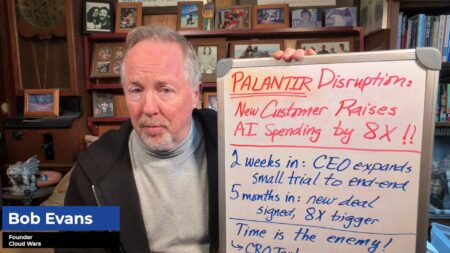While savage competition will be the order of the day across all segments of the red-hot cloud industry, the battle for supremacy in industry-specific clouds will be the most intense because of their massive future revenue potential.
Yes, the big hyperscalers will continue to pour billions into new capacity and will in return be fully prepared to land massive cloud-infrastructure deals. And no doubt some alphabet-soup research report will show that the IaaS market for 2021 dwarfs the projected revenue for industry-specific solutions.
Huge Pull-Along Effect
But consider the pull-along effect these AI- and ML-driven vertical solutions will have on databases, data warehouses, security solutions, analytical tools, related horizontal applications, and an entirely new field of data-powered capabilities that will arise around these vertical solutions.
These modern technologies are predicated on the new dynamics of the digital economy where businesses are truly able, for the first time ever, to put their customers at the center of everything they do. And then from there, they can build upstream to configure (and reconfigure as rapidly and frequently as needed) supply chains, logistics networks, workforce deployment, marketing campaigns, procurement plans, and more.
Prediction #1
These industry clouds and/or industry-specific solutions will begin to supplant “ERP” as the core concept that businesses use when they think about enterprise applications.
Prediction #2
These industry clouds and/or industry-specific solutions will evolve and improve at a dizzying rate as tens of thousands of businesses across every industry begin to rely on them as the strategic digital link to their customers.
Prediction #3
While the major players right now are SAP, Google and Oracle, every major cloud vendor—including Amazon, which has rigorously avoided the applications—will rush to develop highly specialized industry capabilities in 2021. Some, like Amazon, won’t go all the way to vertical applications, but they’ll come right up to the line with related services and technologies.
Prediction #4
By this time next year, the vertical-industry approach will have taken root so deeply and so successfully that customers and vendors alike will begin to drop the term “industry-specific” and replace it with something more along the lines of “business-optimization” solutions.
Prediction #5
In 2021, we’ll see ERP capabilities and related terminology begin to shift away from being internally driven and internally focused, and toward being customers focused. Because, with very few exceptions, there just aren’t that many CEOs who say, “The issue I think about day and night is Enterprise Resource Planning.” But there are a whole helluva lot who spend those hours thinking about end-to-end digital business, data-driven operations and culture, revenue growth, and how to dazzle their customers and gain market share. In 2021, ERP will begin to shift from being the “end” to assuming its proper role as the means to those ends I just mentioned.
Vertical-Industry Developments
We promise to keep a very close watch on this dynamic new sector here in Cloud Wars, and here are some related analyses to help you keep up with all the changes and latest developments:
- Oracle Vs. SAP: Who Will Lead Hot New Market for Industry-Specific Solutions?
- Look Out, Google and SAP: Microsoft Jumping into Red-Hot Industry Solutions
- #1 Microsoft and #4 Google Are Facing a Wicked Cloud Challenge
- Google Launches New Era in Cloud with AI-Powered Industry Solutions
- Google and SAP Fusing Cloud and AI in Next-Gen Apps for Industries
- SAP’s Secret Weapon: Month-Old Industry Cloud Already ‘Growth Driver’
- Hey Microsoft: Google Cloud Is Pushing You Out as SAP’s #1 Cloud Partner
- SAP Will Battle Microsoft & Google for Customer Control, Says CEO Christian Klein
- Google Cloud Helps Drive Triple-Digit Online Growth at Lowe’s
- Microsoft Top 10 Customers for Digital Transformation: the Satya Nadella Touch
Final Thought
I want to be sure I’m very clear regarding some of my thoughts above about ERP: it is an incredibly important, vibrant, and mission-critical set of applications that has, particularly in the cloud, a fantastic future. But as we move into the world of customer-focused digital business, I think it’s time for ERP to shift from being the center of the universe to being an indispensable element in serving the new resident at the universe’s center: the customer.
RECOMMENDED READING
Check out our Cloud Wars Top 10 Special Report: Which Cloud Vendors Will Thrive in 2021? featuring comprehensive overviews of #1 Microsoft, #2 Amazon, #3 Salesforce, #4 Google Cloud, #5 SAP, #6 Oracle, #7 IBM, #8 Workday, #9 ServiceNow, and #10 Adobe. Here are the headlines and links to each of our 10 in-depth analyses:
- Can Amazon, Google or Oracle Replace Microsoft as World’s #1 Cloud Vendor?
- As Amazon Web Services Blows Past $50 Billion, Will Jeff Bezos Trigger Huge IPO?
- With or Without Slack, Salesforce Will Remain #1 in Cloud Applications
- Google Already Fastest-Growing Cloud Vendor, but Thomas Kurian’s Just Getting Started
- SAP’S Huge Bet on Industry Cloud Could Be Game-Changer Against Oracle, Salesforce
- Confounding His Critics, Larry Ellison Turns Oracle into Cloud Powerhouse
- IBM’s Secret Weapon Isn’t Red Hat—It’s Much Bigger than That!
- Workday Doubles Down on Planning, Analytics and ML to Rip and Replace Legacy IT
- Bill McDermott and ServiceNow Are Disrupting the Software Industry—Hallelujah!
- Can Shantanu Narayen and Adobe Replicate Consumer Magic in Enterprise?
Subscribe to the Cloud Wars Newsletter for in-depth analysis of the major cloud vendors from the perspective of business customers. It’s free, it’s exclusive and it’s great!








